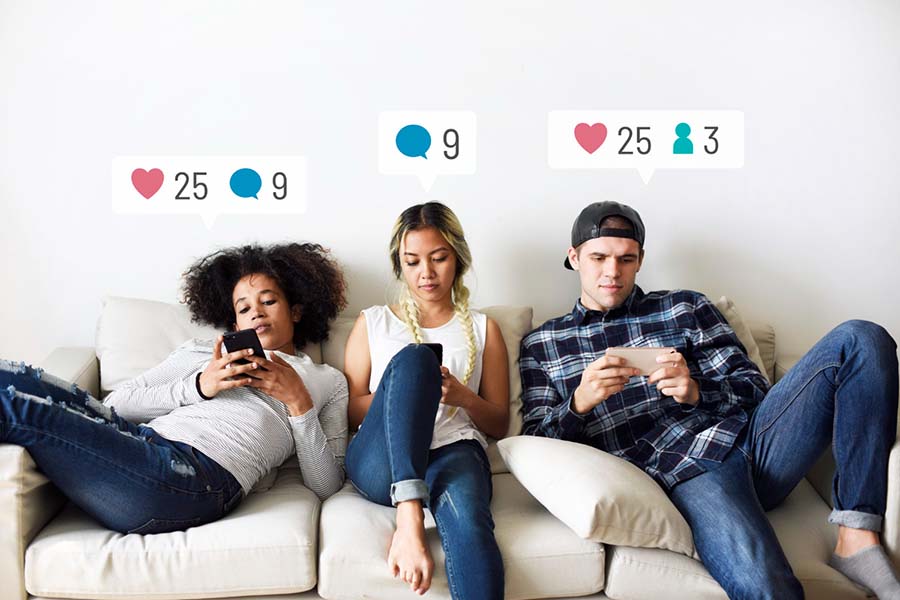Social Media’s Relationship Impact: A Digital Paradox

In today’s digital age, social media has revolutionised the way we communicate and connect with others. With platforms like Facebook, Instagram, Twitter, and Snapchat, staying connected and sharing moments with friends and family has become easier than ever before. However, while social media has its benefits, it also has a profound impact on our relationships and communication. In this article, we will delve into the various ways social media influences our interactions and the effects it has on our personal connections.
The Rise of Online Friendships
Social media has opened up a whole new world of possibilities when it comes to forming and maintaining friendships. With just a few clicks, we can connect with people from all corners of the globe who share similar interests or hobbies. This has resulted in the rise of online friendships, where individuals build connections without ever meeting face-to-face.
While online friendships can be enriching and provide a sense of belonging, it is important to recognise the limitations they may have. Without physical interactions, it can be challenging to truly understand and empathise with the other person. Misinterpretations and misunderstandings are more common in online communication, which can negatively impact the depth and quality of these relationships.
Expanding on this, online friendships offer the opportunity to connect with like-minded individuals who may not be accessible in our immediate physical environment. This can be particularly beneficial for individuals who have niche interests or belong to marginalised communities. It allows them to find a sense of belonging and support that they may struggle to find offline.
However, it’s important to note that online friendships may lack the same level of intimacy and depth as real-life friendships. Physical interactions, such as body language and touch, play a significant role in forming strong bonds with others. Without these elements, online friendships may feel more superficial and less emotionally fulfilling.
Furthermore, miscommunication is more prevalent in online interactions due to the absence of non-verbal cues. Tone of voice, facial expressions, and body language are essential aspects of effective communication, but they are often lost in online exchanges. This can lead to misunderstandings, arguments, and a lack of emotional connection between individuals.
To overcome these limitations, individuals in online friendships should make an effort to engage in more meaningful and open conversations. Video calls, voice messages, or exchanging personal stories can help bridge the gap and create a deeper connection. Additionally, being mindful of the potential for miscommunication and being patient and understanding when conflicts arise can contribute to building stronger online friendships.
Communication in the Digital Age
Social media platforms have transformed the way we communicate, both positively and negatively. On one hand, they offer instant communication, allowing us to connect with others regardless of time and distance. We can easily share updates, photos, and videos, keeping our loved ones updated on our lives. However, this constant connectivity also brings its own set of challenges.
Superficial Interactions
With the abundance of information and distractions on social media, meaningful conversations and deep connections can often take a backseat. Communication becomes more superficial, consisting of likes, comments, and emojis. The brevity of online interactions may lead to a lack of understanding and emotional depth, hindering the development of strong relationships.
To combat superficial interactions, individuals can make a conscious effort to engage in more meaningful conversations on social media platforms. This can involve asking open-ended questions, sharing personal experiences, and expressing genuine interest in others’ lives. By taking the time to truly connect with others, we can foster deeper relationships and create a sense of emotional intimacy.
Additionally, individuals should be mindful of the frequency and quality of their interactions. Instead of simply scrolling through a feed and passively engaging with content, allocating specific time for more focused and intentional communication can help cultivate stronger connections.
Filtered Identities
Social media allows individuals to curate their online personas, presenting only the best aspects of their lives. This often leads to the creation of filtered identities, where people showcase an idealised version of themselves. While this may seem harmless, it can contribute to feelings of inadequacy and comparison, straining relationships as individuals strive to live up to the perceived perfection of others.
To counteract the negative effects of filtered identities, individuals should strive for authenticity and transparency in their online interactions. This involves being open about both the positive and negative aspects of life and sharing genuine experiences. By embracing vulnerability and embracing imperfections, individuals can create an environment of trust and authenticity, leading to stronger and more meaningful connections.
It’s also important to remind ourselves that social media only presents a curated snapshot of someone’s life and may not reflect the reality of their experiences. By recognising that everyone has ups and downs, we can avoid falling into the trap of comparison and focus on building genuine connections based on shared values and interests.
Miscommunication and Conflict
Written communication on social media platforms lacks the non-verbal cues we rely on in face-to-face interactions, such as tone of voice and body language. This absence of context can result in misinterpretations and misunderstandings, leading to conflicts and strained relationships. Moreover, the immediacy of social media may encourage impulsive responses, exacerbating disagreements.
To minimise miscommunication and conflicts, individuals should approach online communication with caution and mindfulness. It’s important to choose our words carefully, considering how they may be interpreted by the recipient. Taking the time to re-read and edit messages before sending them can help ensure clarity and avoid misunderstandings.
When faced with a potential conflict, it’s advisable to step away from the online platform and seek more direct forms of communication. Phone calls or in-person meetings allow for a more comprehensive exchange of ideas and emotions, reducing the likelihood of miscommunication. By addressing conflicts in a respectful and empathetic manner, individuals can preserve and strengthen their relationships.
Impact on Intimate Relationships
Social media’s impact on intimate relationships cannot be overlooked. While it offers opportunities for couples to stay connected and share experiences, it also presents unique challenges that can strain the bond between partners.
Trust and Jealousy
Social media has made it easier than ever to keep tabs on our partners, leading to increased feelings of jealousy and mistrust. The temptation to compare our relationships to others’ highlight reels can breed insecurities and doubts. Moreover, the accessibility to past relationships and connections may create a sense of competition or threaten the exclusivity of a partnership.
To address trust and jealousy issues, couples should prioritise open and honest communication. Establishing clear boundaries and expectations regarding social media usage can help alleviate insecurities and foster trust. It’s crucial to remember that social media only provides a glimpse into others’ lives and should not be the sole basis for comparison or judgment within a relationship.
Additionally, couples can engage in activities that promote trust and intimacy, such as sharing passwords and openly discussing their online interactions. By being transparent and inclusive in their social media presence, partners can reinforce their commitment to each other and strengthen their bond.
Privacy and Boundaries
The prevalence of social media can blur the boundaries between public and private life. Couples may find themselves unintentionally airing their relationship struggles or sharing intimate moments with a wide audience. This lack of privacy can strain trust and lead to discomfort or disagreements.
To maintain privacy and boundaries in the digital age, couples should have open discussions about what is acceptable to share online and what should remain private. Setting mutual guidelines and respecting each other’s boundaries can help protect the intimacy of the relationship. It’s important to strike a balance between sharing moments with others and keeping certain aspects of the relationship sacred and exclusive.
Time and Attention
The addictive nature of social media can consume significant amounts of time and attention, potentially diverting focus away from the relationship. Spending excessive time scrolling through feeds or engaging in online interactions can create distance and neglect in real-life connections.
To prioritise the relationship over social media, couples should set designated times for quality time together, free from digital distractions. This can involve activities such as going for walks, cooking together, or engaging in shared hobbies. By consciously allocating time for each other, partners can nurture their bond and create a strong foundation for their relationship.
Nurturing Healthy Relationships in the Digital Age
While social media undoubtedly impacts relationships and communication, it is possible to navigate these challenges and foster healthy connections.
Mindful Usage
Being mindful of our social media usage is crucial. Setting boundaries and limiting the time spent on these platforms can help maintain a healthy balance between the digital and real world. Prioritising face-to-face interactions and genuine conversations strengthens relationships and promotes emotional intimacy.
In addition to time limitations, individuals should also be mindful of the content they consume on social media. Surrounding ourselves with positive and uplifting content can contribute to a more positive mindset and foster healthy relationships. Unfollowing or muting accounts that trigger negative emotions or feelings of inadequacy can create a healthier online environment.
Effective Communication
To mitigate miscommunication and misunderstandings, it is important to communicate effectively on social media. Taking the time to craft thoughtful messages, using clear language, and being mindful of the tone can reduce the likelihood of conflicts. When a conversation becomes complex, it is often better to switch to more personal and direct forms of communication, such as phone calls or in-person meetings.
Furthermore, active listening plays a crucial role in effective communication. By truly paying attention to the thoughts and emotions expressed by others, we can foster understanding and empathy. Responding with empathy and compassion can lead to more meaningful and fulfilling interactions, strengthening relationships in the process.
Cultivating Trust and Security
Building trust in the digital realm requires open and honest communication. Couples should openly discuss their expectations and boundaries regarding social media usage. Establishing mutual trust and transparency can help alleviate insecurities and foster a healthier relationship dynamic.
In addition to communication, actions also play a significant role in building trust. Consistency, reliability, and follow-through on commitments can demonstrate trustworthiness. Being accountable for one’s actions and showing respect for each other’s boundaries can create a secure and trusting environment within the relationship.
Conclusion
Social media has undeniably transformed the way we communicate and connect with others. While it offers unprecedented opportunities for friendship and connectivity, it also presents challenges that can impact the depth and quality of our relationships. By being mindful of our social media usage, communicating effectively, and nurturing trust and security, we can navigate the digital landscape and maintain healthy connections in the modern world.
If you found this post engaging, don’t forget to explore our additional society blogs:
- Enhancing User Experience: Dewalist Classifieds’ Commitment to Efficient Content Moderation
- Dewalist Soars to New Heights: A December 2023 Recap
- Dewalist Reaches 103 Users per Minute: A Google Analytics Record
- The Wealth of Nations by Adam Smith: A Word Book Summary
- Embracing Remote Work: Shaping Tomorrow’s Workplace
- Navigating Mental Health in the Justice System
- Tech’s Impact on Education: Shaping Future Learning
- Embracing Diversity: Building Inclusive Workplace & Society
- Introducing Our New and Improved Dewalist Marketplace Design
- The Homelessness Epidemic: Unraveling the Housing Crisis
Sign up for updates on this blog and our latest posts if you enjoyed reading this one.
Help your friends and colleagues stay informed about the newest insights on business, marketing, finance, lifestyle, and society by sharing our blog content through Facebook, Twitter, Pinterest, LinkedIn, email, or WhatsApp links below. We can create a knowledge-sharing community and empower one another to accomplish and experience our objectives.
FAQ
What are the limitations of online friendships?
Online friendships can lack the same level of intimacy and depth as real-life friendships due to the absence of physical interactions and non-verbal cues. This can make it challenging to truly understand and empathise with the other person, leading to more superficial and less emotionally fulfilling relationships.
How can individuals combat superficial interactions on social media?
To combat superficial interactions, individuals can make a conscious effort to engage in more meaningful conversations. This can involve asking open-ended questions, sharing personal experiences, and expressing genuine interest in others’ lives. By taking the time to truly connect with others, deeper relationships and a sense of emotional intimacy can be fostered.
How can miscommunication and conflicts be minimised in online communication?
To minimise miscommunication and conflicts, individuals should approach online communication with caution and mindfulness. It’s important to choose words carefully, consider how they may be interpreted, and take the time to re-read and edit messages before sending them. When faced with a potential conflict, it’s advisable to step away from the online platform and seek more direct forms of communication, such as phone calls or in-person meetings.
How can trust and jealousy issues be addressed in intimate relationships affected by social media?
To address trust and jealousy issues, couples should prioritise open and honest communication. Establishing clear boundaries and expectations regarding social media usage can help alleviate insecurities and foster trust. It’s crucial to remember that social media only provides a glimpse into others’ lives and should not be the sole basis for comparison or judgment within a relationship. Additionally, engaging in activities that promote trust and intimacy, such as sharing passwords and openly discussing online interactions, can reinforce commitment and strengthen the bond between partners.
Credits
Featured image by rawpixel.com on Freepik.









